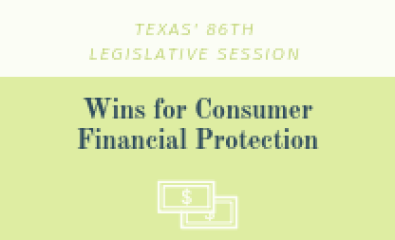
86th Legislative Session Delivers Important Wins for Consumer Financial Protection Despite Powerful Lobby Efforts in Support of Predatory Lending Practices
In collaboration with a network of allies and partners, including members of the Texas Fair Lending Alliance, progress was made in the areas of debt collection reform, accountability in the online lending arena, and through whittling away at the ability of rent-to-own businesses to misuse our criminal justice system by filing criminal complaints to collect delinquent debts.
Equally important, our coalition was able to stop harmful assaults that would have preempted beneficial local payday and auto title reform ordinances, enabled new predatory lending products, and raised the cost of credit for subprime borrowers in Texas. The Dallas Morning News and San Antonio Express-News published powerful editorials in support of fair lending practices, and the Fort Worth Star-Telegram published an op-ed on the importance of city payday and auto title lending ordinances, now covering over 10 million Texans in 45 cities.
Progress Supporting the Financial Well-Being of Texans:
- HB 996—closes a loophole in Texas law, to help ensure that debt buyers do not sue over time-barred debts (typically debts that are more than four years old in Texas) and prohibits debt buyers from restarting the four-year litigation clock if the borrower makes a payment—removing tricks and traps from the debt collection process.
- HB 1442— a Sunset bill for the Texas Office of Consumer Credit Commissioner, which regulates consumer lending in Texas, and includes language that gives the commissioner clear oversight of consumer lending in the online space. With the growth in both volume and fraud in this space, it is essential for the state regulator to have clear authority over online consumer lending.
- HB 2524—substantially limits how rent-to-own businesses can use criminal laws to collect on defaulted transactions. We had hoped to eliminate criminal prosecution in this area, but nonetheless, important progress was made with this bill.
Texas Appleseed has worked hard over the past decade to rein in abusive lending practices in our state—with a focus on uncapped payday and auto title loans, that often average over 500% APR. As one U.S. military veteran from Houston put it, “They are not worth getting involved with, they suck you in for a quick fix and you have to get another then another, they only make your situation worse.” Establishing a statewide standard for fair payday and auto title lending practices once again proved elusive this session despite substantial evidence documenting the need for reforms.
Moving Forward:
As always, a powerful and well-funded lobby roamed the halls of the Capitol this past session, blocking consideration of bills that would make important market improvements in Texas.
- They undermined a bill that would have strengthened penalties for payday and auto title loan businesses that abuse our criminal justice system. There is a history of payday lenders violating the Texas Constitution by filing criminal bad check and theft by check complaints to collect on a debt (a 2014 Texas Appleseed study documented substantial abuse in this area);
- They stopped a bill that would require high-cost lenders to engage in a basic assessment of the borrower’s ability to repay a loan before granting it—to address the unending cycle of debt too often caused by uncapped payday and auto title loans and that has proven particularly harmful to Texas veterans; and
- They blocked efforts to adopt a rate cap or the city ordinance regulatory model for payday and auto title lending into state law—a model that has proven effective in reducing harmful impacts of these uncapped loan products.
We will continue to work with local, statewide, and national partners to push for positive market reforms and to rein in lending abuses that harm financially vulnerable Texans. We persist in this work because we see time and again the harmful impacts of high-cost payday and auto title loans, as well as other predatory financial products and practices, on individual Texans and on local economies.